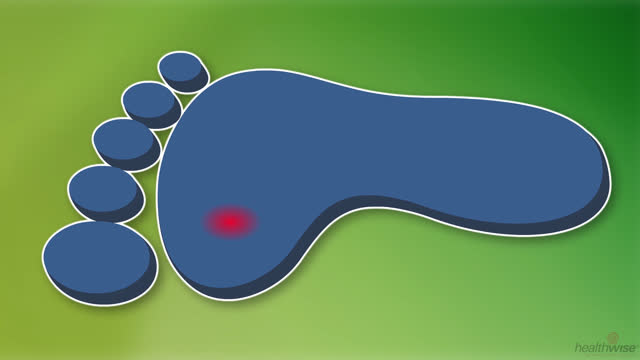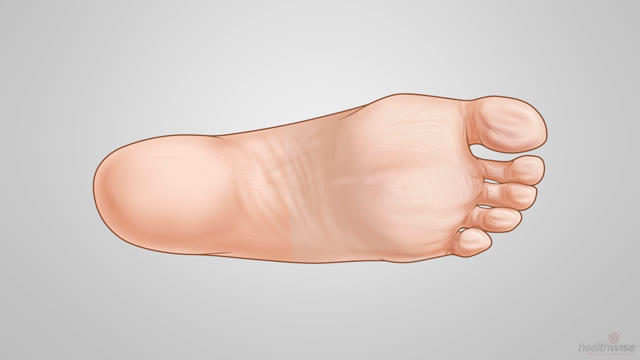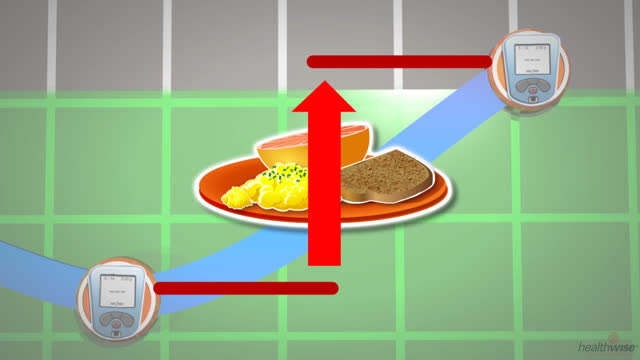Top of the pageActionset
Diabetes: Taking Care of Your Feet
Introduction
When you have diabetes, your feet need extra care and attention. Diabetes can damage the nerve endings and blood vessels in your feet, making you less likely to notice when your feet are injured. Diabetes can also interfere with your body’s ability to fight infection. If you develop a minor foot injury, it could become an ulcer or develop into a serious infection. Ulcers can be found on the bottom of your feet, or on the top or bottom of your toes. With good foot care, you can prevent most of these problems.
Caring for your feet is easy. Most of the care can be done when you are bathing and getting ready for bed. Preventing injury to your feet is merely a matter of wearing properly fitted shoes and socks at all times.
These steps can help keep your feet healthy:
- Examine your feet every day. And have your doctor examine your feet during every visit.
- Check your shoes for any loose objects or rough edges before you put them on.
- Look at foot care as part of your daily routine. Soon it will become as automatic as brushing your teeth.
- Don’t use home remedies to treat foot problems. Home remedies can hurt your feet. Over-the-counter medicine designed to remove calluses could contain chemicals that could burn your skin. Also, trying to cut corns or calluses yourself could lead to infections.
- Get early treatment for any foot problem, even a minor one.
How do you care for your feet?
Here’s how you can get started caring properly for your feet.
- Inspect your feet at least once a day. Look at all areas of your feet, including your toes. This is the most important part of your foot care. You can use a handheld mirror or magnifying mirror attached to the bathroom wall near the baseboard to inspect your feet. If you can’t see well, have someone assist you.
- Wash your feet daily. Post the steps for foot-washing and nail care in your bathroom. Refer to the steps when you wash your feet so that they become a habit. Make sure you dry your feet and toes well before putting on shoes and socks.
- Wear shoes and socks that fit well. Soft shoes that have good support and that fit well (such as tennis shoes) are best for your feet. Use the checklist for shoes that fit well when you buy new shoes. Break in new shoes slowly by wearing them for a few hours each day and increasing the number of hours you wear them each week. Wear socks that do not have seams.
- Protect your feet from injury. Before you put on your shoes, check for objects (such as pebbles) or rough spots inside your shoes or objects pushing through the soles. Inspect your feet for blisters, cuts, or scrapes after activities such as hiking or skiing. If you can’t see well, have someone do this for you. Post a list of precautions to protect your feet when you have diabetes in your closet near your shoes.
- Ask your doctor to check your feet during each visit. Your doctor may notice a foot problem you have missed. Take off your shoes and socks while you are waiting for your doctor. This will help remind your doctor to check your feet. Write down any minor problems or questions you may have about foot care, and take this with you when you visit your doctor.
- Get early treatment for foot problems. Call your doctor even for minor foot problems, unless you have already learned from your doctor how to handle these problems. Your doctor may refer you to a podiatrist or orthopedic surgeon if special treatment is needed. A serious problem can develop from what seems like a minor irritation. If a foot problem develops, you need to seek care early.
Credits
Current as of: April 16, 2019
Author: Healthwise Staff
Medical Review:E. Gregory Thompson, MD – Internal Medicine & Adam Husney, MD – Family Medicine & Kathleen Romito, MD – Family Medicine & David C. W. Lau, MD, PhD, FRCPC – Endocrinology
Current as of: April 16, 2019
Author: Healthwise Staff
Medical Review:E. Gregory Thompson, MD – Internal Medicine & Adam Husney, MD – Family Medicine & Kathleen Romito, MD – Family Medicine & David C. W. Lau, MD, PhD, FRCPC – Endocrinology
This information does not replace the advice of a doctor. Healthwise, Incorporated, disclaims any warranty or liability for your use of this information. Your use of this information means that you agree to the Terms of Use. Learn how we develop our content.









